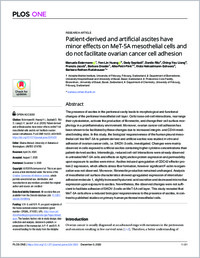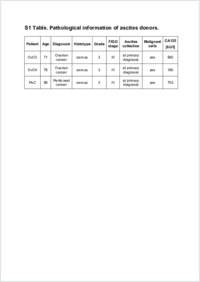Patient-derived and artificial ascites have minor effects on MeT-5A mesothelial cells and do not facilitate ovarian cancer cell adhesion
- Estermann, Manuela Adolphe Merkle Institute, University of Fribourg, Fribourg, Switzerland
- Huang, Yen-Lin Department of Biomedicine, University Hospital Basel and University of Basel, Basel, Switzerland
- Septiadi, Dedy Adolphe Merkle Institute, University of Fribourg, Fribourg, Switzerland
- Ritz, Danilo Proteomics Core Facility, Biozentrum, University of Basel, Basel, Switzerland, 4 Department of Chemistry, University of Fribourg, Fribourg, Switzerland
- Liang, Ching-Yeu Department of Biomedicine, University Hospital Basel and University of Basel, Basel, Switzerland
- Jacob, Francis Department of Biomedicine, University Hospital Basel and University of Basel, Basel, Switzerland
- Drasler, Barbara Adolphe Merkle Institute, University of Fribourg, Fribourg, Switzerland
- Petri-Fink, Alke Adolphe Merkle Institute, University of Fribourg, Fribourg, Switzerland -
- Heinzelmann-Schwarz, Viola Department of Biomedicine, University Hospital Basel and University of Basel, Basel, Switzerland
- Rothen-Rutishauser, Barbara Adolphe Merkle Institute, University of Fribourg, Fribourg, Switzerland
- 03.12.2020
Published in:
- PLOS ONE. - 2020, vol. 15, no. 12, p. e0241500
English
The presence of ascites in the peritoneal cavity leads to morphological and functional changes of the peritoneal mesothelial cell layer. Cells loose cell-cell interactions, rearrange their cytoskeleton, activate the production of fibronectin, and change their cell surface morphology in a proinflammatory environment. Moreover, ovarian cancer cell adhesion has been shown to be facilitated by these changes due to increased integrin- and CD44-mediated binding sites. In this study, the biological responsiveness of the human pleural mesothelial cell line MeT-5A to patient-derived and artificial ascites was studied in vitro and adhesion of ovarian cancer cells, i.e. SKOV-3 cells, investigated. Changes were mainly observed in cells exposed to artificial ascites containing higher cytokine concentrations than patient-derived ascites. Interestingly, reduced cell-cell interactions were already observed in untreated MeT-5A cells and effects on tight junction protein expression and permeability upon exposure to ascites were minor. Ascites induced upregulation of CDC42 effector protein 2 expression, which affects stress fiber formation, however significant F-actin reorganization was not observed. Moreover, fibronectin production remained unchanged. Analysis of mesothelial cell surface characteristics showed upregulated expression of intercellular adhesion molecule 1, slightly increased hyaluronic acid secretion and decreased microvillus expression upon exposure to ascites. Nevertheless, the observed changes were not sufficient to facilitate adhesion of SKOV-3 cells on MeT-5A cell layer. This study revealed that MeT-5A cells show a reduced biological responsiveness to the presence of ascites, in contrast to published studies on primary human peritoneal mesothelial cells.
- Faculty
- Faculté des sciences et de médecine
- Department
- Département de Chimie, AMI - Bio-Nanomatériaux
- Language
-
- English
- Classification
- Biological sciences
- License
-
License undefined
- Identifiers
-
- RERO DOC 329896
- DOI 10.1371/journal.pone.0241500
- Persistent URL
- https://folia.unifr.ch/unifr/documents/309081
Other files
Statistics
Document views: 151
File downloads:
- pdf: 203
- Supplementary material: 114

